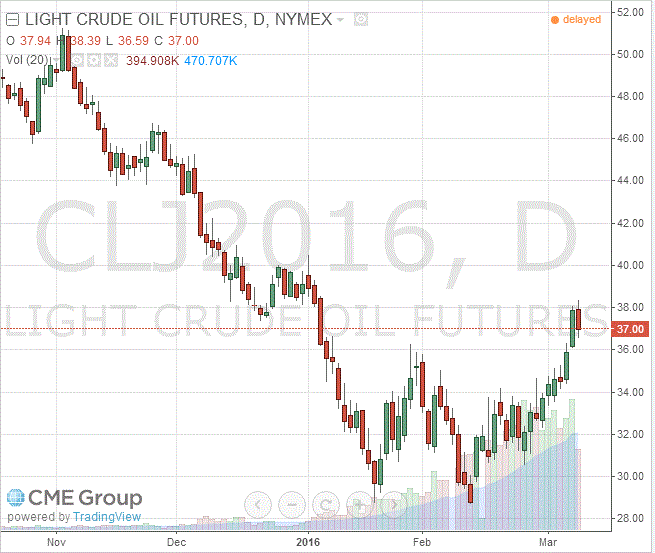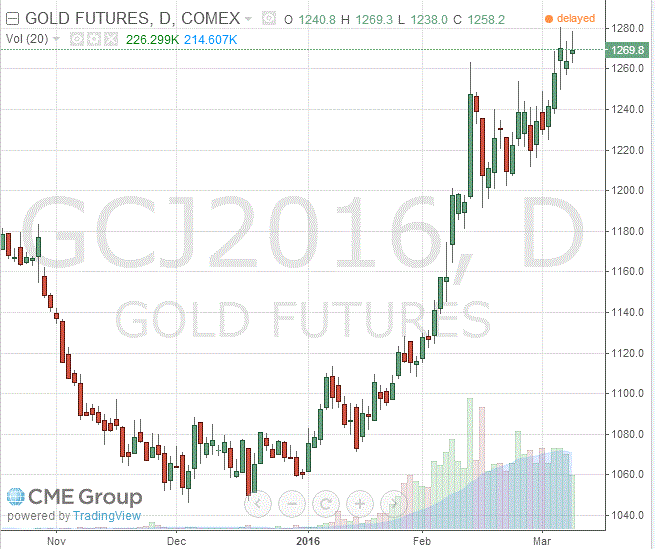Noticias del mercado
-
17:55
Oil prices decline as hopes for the freeze of the oil production seems to disappear
Oil prices declined as hopes for the freeze of the oil production seemed to disappear. Kuwait's oil minister, Anas al-Saleh, said on Tuesday that Kuwait would agree to freeze the oil output only if all major oil producers, including Iran, participate.
The Chinese trade data also weighed on oil prices. The Chinese Customs Office released its trade data on Tuesday. China's trade surplus dropped to $32.59 billion in February from $63.30 billion in January, beating expectations for a decline to a surplus of $50.15 billion. Exports fell at an annual rate of 25.4% in February, the biggest drop since May 2009, while imports slid at an annual rate of 13.8%, the fifteenth consecutive decline.
WTI crude oil for April delivery decreased to $37.00 a barrel on the New York Mercantile Exchange.
Brent crude oil for April fell to $39.93 a barrel on ICE Futures Europe.
-
17:25
Gold climbs slightly
Gold price rose on a weaker U.S. dollar and as global stocks declined on the Chinese trade data. The Chinese Customs Office released its trade data on Tuesday. China's trade surplus dropped to $32.59 billion in February from $63.30 billion in January, beating expectations for a decline to a surplus of $50.15 billion. Exports fell at an annual rate of 25.4% in February, the biggest drop since May 2009, while imports slid at an annual rate of 13.8%, the fifteenth consecutive decline.
April futures for gold on the COMEX today rose to 1269.80 dollars per ounce.
-
14:58
OECD’s leading composite leading indicator declines to 99.62 in January
The Organization for Economic Cooperation and Development (OECD) released its leading indicators on Tuesday. The composite leading indicator decreased to 99.62 in January from 99.7 in December.
It signalled stable growth in the Eurozone as a whole and Italy.
There were signs of stabilising growth momentum in France and India.
The index for the U.S., the U.K., Canada, Germany and Japan pointed to an easing in growth momentum.
The index for China confirmed the tentative signs of stabilisation.
The index for Russia showed signs of a loss in growth momentum.
-
10:55
China's trade surplus drops to $32.59 billion in February
The Chinese Customs Office released its trade data on Tuesday. China's trade surplus dropped to $32.59 billion in February from $63.30 billion in January, beating expectations for a decline to a surplus of $50.15 billion.
Exports fell at an annual rate of 25.4% in February, the biggest drop since May 2009, while imports slid at an annual rate of 13.8%, the fifteenth consecutive decline.
Chinese New Year is likely to have some impact on the data. Nevertheless, the trade data indicates that there is the slowdown in the Chinese economy.
-
10:10
Fitch Ratings downgrades its global growth forecasts
Rating agency Fitch Ratings downgraded its global growth forecasts on Monday. The agency expects the global economy to expand 2.5% in 2016, down from its December estimate of 2.9%. Advanced economies are expected to grow 1.7% this year, down from its December estimate of 2.1%, while emerging economies are expected to expand 4.0%, down from its December estimate of 4.4%.
Fitch expects the Chinese economy to grow 6.2% in 2016, down from its December estimate of 6.3%.
The agency noted that the downward revision was driven by the slowdown in the Chinese economy and lower spending in commodities-dependent countries.
Fitch pointed out that there was no recession.
"The breadth of the revisions is notable but still leaves the growth outlook a long way above global recession territory," the agency said.
-
00:31
Commodities. Daily history for Mar 7’2016:
(raw materials / closing price /% change)
Oil 37.98 +0.21%
Gold 1,268.00 +0.32%
-

